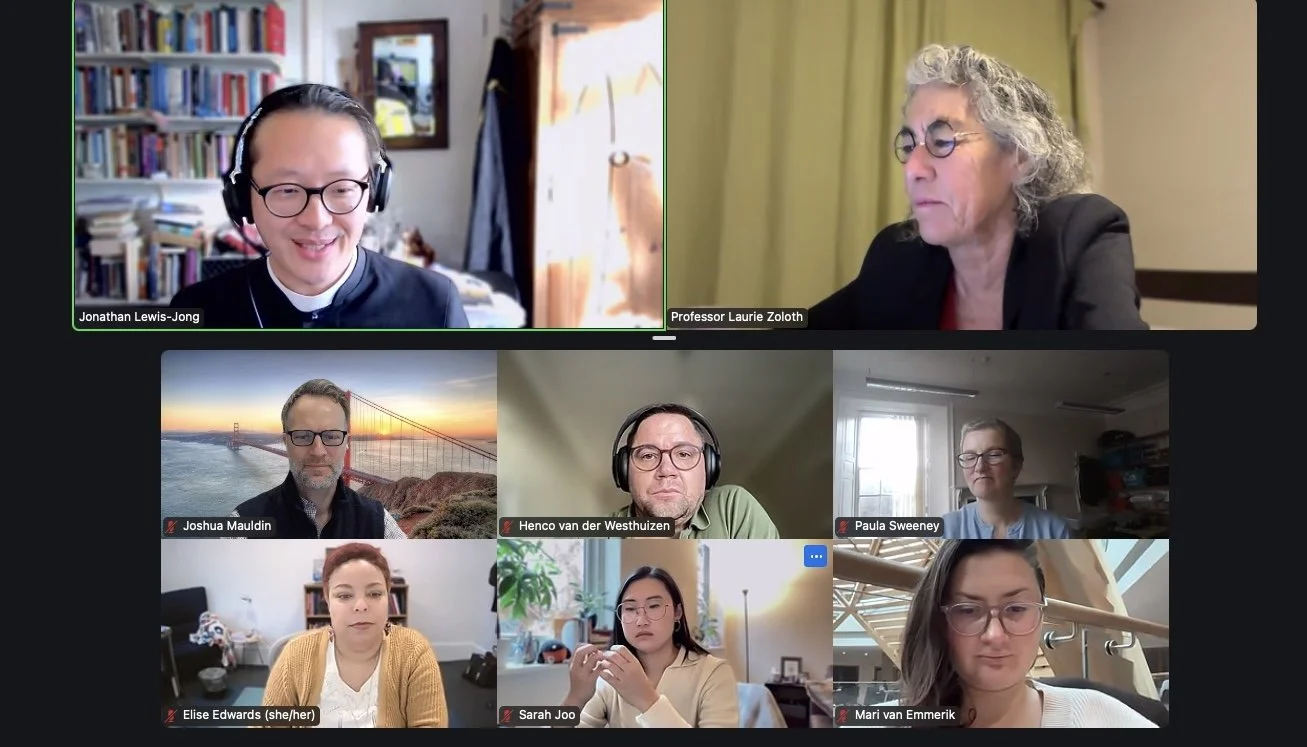CTI Explores the Challenge of Artificial Intelligence
The series of online seminars for the first cohort of the Despair to Hope project is underway, with Fellows participating from South Africa, Scotland, England, and the United States.
The first three sessions, to be replicated for all five cohorts, introduced the overarching theme of the project—hope—from three different disciplinary perspectives: theology, philosophy, and psychology. CTI Director Tom Greggs led the discussion of theologies of hope, situating the topic intellectually, but also in contemporary economic and political terms. This session was supplemented by readings in eschatology, theological ethics, and political and liberation theology. The project’s Continuity Fellow, Michael Milona (Ryerson University)—who was involved in the John Templeton Foundation-funded Hope and Optimism project (University of Notre Dame)—then provided an overview of philosophical issues involved in thinking about hope as a distinctive mental state or disposition. In the final general seminar, Jonathan Lewis-Jong (St Mary’s University Twickenham) focused on issues of measurement in the psychological study of hope and related constructs.
The next three sessions will take the same three disciplinary perspectives, but turn the fellows’ attention to this cohort’s special area of interest: technology and artificial intelligence. Guided by a series of readings curated by our Interdisciplinary Consultant, Lewis-Jong, the Fellows have been delving into the theological, philosophical, and psychological research literatures on AI. In the Theology & AI session, the Fellows first read the Vatican’s Note Antiqua et Nova, which draws a strong distinction between human rationality and artificial intelligence, and addresses many of the Roman Catholic Church’s moral concerns about the use of AI. They then discussed a paper by David Zvi Kalman, “Artificial Intelligence and Jewish Thought,” concerning how the history of halakhic commentary might bear upon questions of the proper use (and abuse) of AI. Finally, they pivoted to Noreen Herzfeld’s paper, “The Eschatological Future of Artificial Intelligence,” which made acute some of the potential dangers of AI when wielded poorly.
The Philosophy & AI seminar began with Vincent Müller’s “Philosophy of AI” for an overview of the philosophical questions—mainly from the philosophy of mind, and concerned with the nature of human cognition and consciousness—that are affected by AI. Thereafter, it turned to Rhiannon Firth and Andrew Robinson’s “Robotopia” to provide a taxonomy of views in the political philosophy of AI based on two dimensions: optimism-pessimism and humanism-assemblage. The optimism-pessimism spectrum is relatively self-explanatory; the human-assemblage dimension is about one’s locus of concern, whether it is people, especially as individuals, or a more diverse ecosystem, including for example societies, nonhuman animals, and even robots. Matthew Le Bui and Safiya Umoja Noble’s manifesto, subtitled “On the Limits, Failings, and Ethics of Fairness,” came next, which criticized efforts to mitigate the potential damage of AI at the margins, and exhorted readers to scrutinize the stakeholders granted the authority to consider and implement ethical concerns about the design and use of AI.
Finally in this second part of the seminar series, the Fellows read papers on Psychology & AI, beginning with Kurt Gray and colleague’s “The Psychology of Robots and Artificial Intelligence.” This paper is mainly concerned with the ways in which people perceive and respond to “agents of replacement” like artificially intelligent systems: it argues and explains that we are strongly predisposed to seeing them as agents, and sets out some predictors of when we are attracted or averse to them. “The Moral Psychology of Artificial Intelligence,” by Jean-François Bonnefon and colleagues, takes a related approach and covers some of the same ground, but focuses on the ways in which artificially intelligent systems can be moral agents, patients, and proxies.
The third phase of this seminar series will be led by external speakers, the project’s Interdisciplinary Collaborators. We have an exciting slate of speakers lined up for this cohort. Eric Schwitzgebel is Professor of Philosophy at the University of California at Riverside, and has just completed AI and Consciousness (Cambridge University Press). Manu Chopra is CEO of Karya, a social enterprise, based in India, whose mission is to push the AI revolution forward “without leaving anyone behind." Nabiha Syed is Executive Director of the Mozilla Foundation, which is dedicated to creating and fostering a better, more equitable, less intrusive Internet. Matteus Pan is Director of Product and Engineering at Genesis Therapeutics, which uses AI to analyze proteins to discover new medicines. Jacqueline Lu is CEO of Helpful Places, a social impact enterprise that works on making open-source data useful for urban planning and development, and helping people see how AI shapes our built environment. We look forward to reporting back on these talks.
The Revd. Dr. Jonathan Lewis-Jong is an experimental psychologist and Anglican priest. He is Researcher in Psychology of Religion at St Mary's University Twickenham London and an Associate Member of the Faculty of Theology and Religion, University of Oxford. He has authored or co-authored over 80 articles in psychology, anthropology, philosophy, and theology. His recent books include Experimenting with Religion (OUP, 2023), and the forthcoming The Nature of Belief (OUP; with Eric Schwitzgebel, eds).

